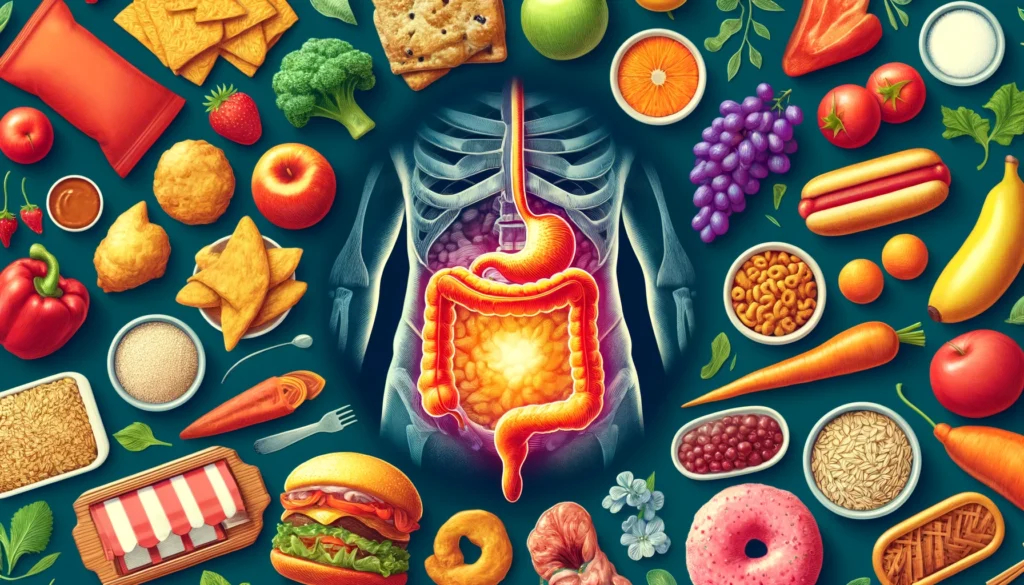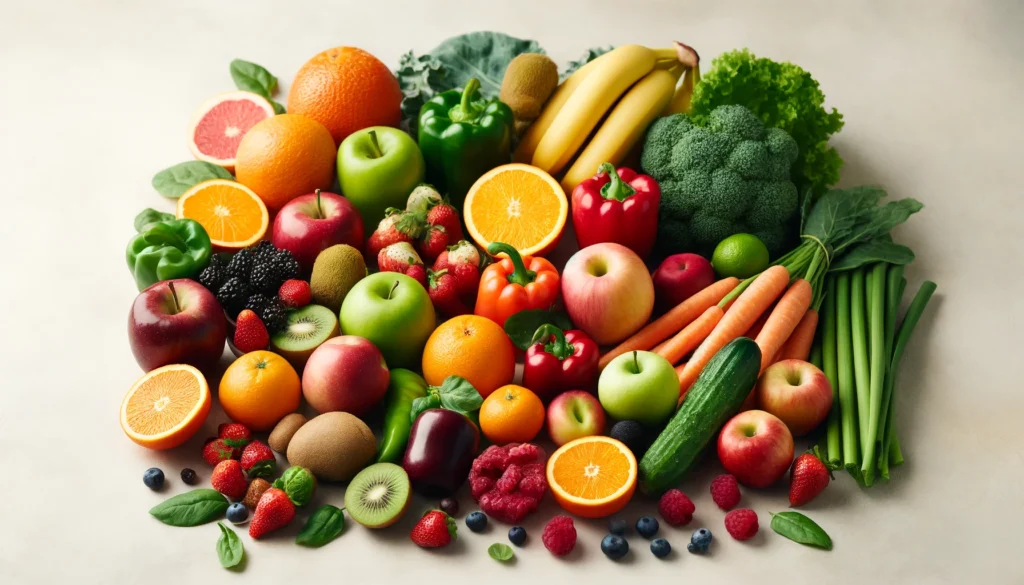
Appendicitis is a common yet potentially serious medical condition that occurs when the appendix becomes inflamed. What food can cause appendicitis?
While genetics and lifestyle factors play a role in the development of appendicitis, the foods we consume can also have an impact on our digestive health.
In this blog post, we will explore what food can cause appendicitis and how dietary choices can influence the risk of this condition.
Understanding Appendicitis and Its Causes
Appendicitis is the result of an inflammation of the appendix, a finger-shaped pouch projecting from. The colon is located in the lower right area of the abdomen.
The condition typically arises when the appendix becomes blocked by either stool, a foreign body, cancer, or an infection.
These blockages can lead to increased pressure, decreased blood flow, and bacterial growth within the appendix, resulting in inflammation.
If left untreated, this inflammation can cause the appendix to rupture, releasing bacteria into the abdomen and leading to potentially severe complications.
While the precise mechanism of how these blockages form is not entirely understood, it’s believed that a combination of lifestyle factors and genetic predisposition may contribute to the risk.
Interestingly, the incidence of appendicitis is lower in societies with diets high in fiber, suggesting a link between diet and the condition.
However, it is crucial to note that appendicitis can happen to anyone, regardless of diet or lifestyle.
The role of the appendix in the human body has long been a subject of debate.
Historically considered a vestigial organ, recent studies suggest the appendix may play a part in our immune system by storing good bacteria that can help reboot the digestive system after gastrointestinal diseases.
This insight provides a broader understanding of the importance of maintaining a healthy gut environment as a preventive measure against appendicitis.
The initial symptoms of appendicitis are often vague, starting with abdominal pain that gradually becomes more sharp and severe, typically concentrating in the lower right abdomen.
Other symptoms might include fever, nausea, and changes in bowel habits.
Due to the commonality of these symptoms with other ailments, appendicitis can be challenging to diagnose without professional medical evaluation.
Understanding the underlying causes and risk factors of appendicitis is pivotal in recognizing the signs early and seeking prompt treatment.
While dietary choices alone cannot prevent appendicitis, a balanced diet supporting a healthy digestive system can be a crucial component in minimizing the risk.
Debunking the Myth: What Food Can Cause Appendicitis
One of the enduring myths surrounding appendicitis is that it can be directly triggered by consuming certain types of food.
This misconception often leads to unnecessary food avoidance and confusion about dietary habits and their impact on our health.
It’s important to clarify that appendicitis is not caused by any specific food or food group.
While diet plays a crucial role in maintaining overall digestive health, attributing the onset of appendicitis to particular foods is a misunderstanding of the condition’s etiology.
The development of appendicitis is primarily associated with blockages within the appendix itself.
These obstructions can be due to various factors, including an accumulation of fecal matter, enlargement of lymphoid follicles, or even parasites.
Such blockages lead to inflammation and, potentially, an appendicitis episode.
However, these blockages are not directly caused by specific foods but may be related to overall dietary patterns, particularly those that influence the health of the digestive tract.
A diet lacking in fiber, for example, can contribute to constipation, increasing the risk of fecal blockages that could, in theory, contribute to appendicitis.
In contrast, a balanced diet rich in fruits, vegetables, and whole grains promotes regular bowel movements and a healthy gut microbiome, which can help minimize the risk of appendicitis.
It’s also worth mentioning that high-fat diets can negatively affect gut motility and contribute to the conditions that might increase the likelihood of appendicitis, albeit indirectly.
High-Fat Diets and Their Link to Appendicitis Risk

High-fat diets have increasingly become a subject of scrutiny within medical research circles, especially concerning their impact on digestive health.
Emerging studies highlight a potential correlation between the consumption of foods high in unhealthy fats and an elevated risk of appendicitis.
Gastrointestinal System
This connection is grounded in the understanding of how fats affect the gastrointestinal system.
Consuming a diet laden with saturated fats from sources like fried foods, buttery pastries, and fatty cuts of meat can significantly slow the digestive process.
This deceleration in digestion may lead to the formation of harder, more compact stools, a condition that can foster the development of obstructions within the appendix.
Gut Microbiome
Another critical aspect to consider is the influence of high-fat diets on the gut microbiome.
An imbalance in the gut flora, often exacerbated by excessive intake of unhealthy fats, can contribute to an environment conducive to digestive complications.
This dysbiosis can trigger inflammatory responses in the gut, thereby increasing the susceptibility to conditions like appendicitis.
Gut Motility
Furthermore, high-fat diets are known to impact gut motility negatively.
The efficiency with which the intestines move contents through the digestive tract can be impaired by diets rich in unhealthy fats, contributing further to the likelihood of fecal matter forming blockages in the appendix.
These obstructions are a primary concern, as they are central to the onset of appendicitis, highlighting a tangible link between dietary fat consumption and appendicitis risk.
The relationship between high-fat diets and appendicitis underscores the importance of dietary moderation and the selection of healthier fat sources.
Incorporating fats from avocados, nuts, and fish can offer a more balanced approach to fat consumption, mitigating the risk factors associated with appendicitis.
It’s a nuanced understanding that while no food type singularly causes appendicitis, our dietary patterns, particularly those involving high-fat intake, can predispose us to a higher risk of developing this condition.
Fiber-Rich Foods: Can They Prevent Appendicitis?
In the realm of dietary choices and their impact on our digestive health, the inclusion of fiber-rich foods plays a pivotal role.
These foods are not just vital for ensuring regular bowel movements; they also serve as a preventive measure against the development of appendicitis.
Multifaceted
The mechanism through which fiber aids this process is multifaceted.
By absorbing water, fiber increases stool bulk and softens it, facilitating easier passage through the colon and reducing the likelihood of the stool becoming hard and compact.
This, in turn, minimizes the chance of fecal matter creating blockages in the appendix, which is a primary trigger for appendicitis.
Dietary Fiber
Dietary fiber is found abundantly in a variety of foods, each offering a wealth of nutrients alongside their fiber content.
Fruits and vegetables, for example, not only provide fiber but also essential vitamins and minerals that support overall health.
Whole grains and legumes, similarly, are excellent sources of dietary fiber, contributing to a feeling of fullness, aiding in weight management, and supporting the health of the digestive system.
By incorporating these foods into daily meals, individuals can enhance their digestive health and potentially reduce the risk of appendicitis.
Moderation
It is important, however, to approach dietary changes with moderation, especially when increasing fiber intake.
A sudden and significant increase in fiber can lead to gastrointestinal discomfort, such as bloating and gas.
Gradually incorporating fiber-rich foods into the diet allows the digestive system to adjust without causing undue distress.
Hydration
Additionally, ensuring adequate hydration by drinking plenty of water is crucial when consuming a high-fiber diet.
Water works synergistically with fiber, helping to facilitate its movement through the digestive tract and enhancing its effectiveness in preventing constipation and reducing the risk of appendicitis.
Emphasizing the consumption of fiber-rich foods offers a simple yet effective strategy for supporting digestive health and minimizing the risk of appendicitis.
By focusing on a diet that includes a variety of fruits, vegetables, whole grains, and legumes, individuals can take proactive steps toward maintaining a healthy and functioning digestive system.
Foods to Avoid If You’re Prone to Digestive Issues
Navigating the complexities of digestive health can be challenging, especially for those who find themselves frequently grappling with gastrointestinal discomfort.
Identifying foods that may exacerbate underlying issues is a crucial step in fostering a healthier digestive system and potentially mitigating the risk of appendicitis.
For individuals with a propensity toward digestive distress or a familial predisposition to appendicitis, being mindful of one’s diet becomes even more paramount.
Spicy Food
Among the various food categories, spicy foods are notorious for causing irritation within the digestive tract.
The capsaicin present in spicy dishes, while invigorating to the palate, can lead to increased acidity and exacerbate symptoms of discomfort, particularly in those with sensitive systems.
Dairy Products

Similarly, dairy products pose a challenge for individuals with lactose intolerance. The inability to properly digest lactose can lead to bloating, gas, and diarrhea, thereby straining the digestive system.
High-Sugar Foods
High-sugar foods are another category to approach with caution. Foods laden with refined sugars can disrupt the balance of gut flora, fostering an environment conducive to inflammation and discomfort.
Such imbalances may not only exacerbate existing digestive issues but could also indirectly influence the conditions under which appendicitis may develop.
Processed Foods
Processed foods, rich in unhealthy fats and lacking in nutritional value, can also impair digestive health.
These foods often contribute to constipation and hinder the body’s natural digestive processes, potentially leading to complications that increase the risk of appendicitis.
Individual Reactions
It’s beneficial to recognize that individual reactions to certain foods can vary widely.
Keeping a food diary can be an insightful tool for pinpointing specific triggers that worsen digestive symptoms.
Irritants
By carefully monitoring and adjusting one’s diet to limit or exclude irritants, individuals can take significant strides toward improving their digestive health and reducing the likelihood of encountering severe complications such as appendicitis.
Making informed dietary choices in consultation with healthcare providers or dietitians can offer a tailored approach to managing and mitigating digestive issues effectively.
Nutritional Strategies for a Healthy Appendix
Crafting a diet that nurtures a healthy appendix revolves around embracing foods that bolster our digestive health, while being mindful to sidestep those that could impose strain on our digestive system.
Nutrient-Dense Foods
Focusing on nutrient-dense foods that provide a variety of vitamins, minerals, and other essential nutrients is key.
Fruits and Vegetables

Fresh fruits and vegetables not only supply these vital nutrients but also contribute to the necessary fiber intake that promotes regular bowel movements and prevents the buildup of stool that can block the appendix.
Whole Grains
Integrating whole grains into your diet is another strategic move for a healthy appendix.
Options such as brown rice, quinoa, and whole wheat products are rich in fiber, supporting digestive health and aiding in the prevention of constipation, which is a risk factor for appendicitis.
Legumes
Additionally, the inclusion of legumes, such as beans, lentils, and chickpeas, not only diversifies the sources of fiber in the diet but also provides protein and other key nutrients that support overall health.
Lean Proteins
Lean proteins, from sources like poultry, fish, and plant-based proteins, should be prioritized over red meats high in saturated fats.
These healthier protein options contribute to a balanced diet without overburdening the digestive system.
Healthy Fats
Incorporating healthy fats, like those found in avocados, olive oil, nuts, and seeds, supports the body’s overall health while avoiding the negative impacts associated with high-fat diets.
Probiotic-Rich Foods
Probiotic-rich foods play a crucial role in maintaining gut flora balance, which is essential for a healthy digestive tract.
Regular consumption of yogurt, kefir, sauerkraut, and other fermented foods can help in nurturing the gut microbiome, creating a favorable environment that wards off digestive troubles.
Moderate Food Intake
It’s equally important to moderate the intake of foods known to irritate the digestive system or contribute to poor digestive health, such as highly processed foods, sugary treats, and overly spicy dishes.
By adopting these nutritional strategies, one can create a dietary pattern that not only supports the health of the appendix but also contributes to the overall well-being of the digestive system.
Understanding the Role of Hydration in Digestive Health
Hydration plays a pivotal role in the proper functioning of the digestive system, serving as an essential component in the prevention of appendicitis.
Food Breakdown
Water is vital for numerous bodily processes, including digestion. It aids in the breakdown of food so that the body can absorb the nutrients more efficiently.
Intestinal Lining
Moreover, hydration is key to maintaining the mucosal lining of the intestines, which helps to ensure smooth transit of food through the digestive tract.
Adequate fluid intake is crucial in keeping the stool soft, thereby facilitating easier passage through the colon.
This mechanism significantly reduces the risk of constipation, a condition that can contribute to the formation of blockages that might lead to appendicitis.
Dehydration
When the body is dehydrated, the colon extracts more water from the stool, causing it to harden and potentially resulting in constipation.
Incorporating hydrating foods into one’s diet, such as cucumbers, tomatoes, oranges, and melons, can also contribute to overall fluid intake and support digestive health.
These foods contain significant amounts of water and provide a dual benefit of hydration and fiber, further aiding in the prevention of constipation.
Signals
Additionally, it’s important to recognize the signals your body sends regarding hydration needs.
Thirst is an obvious indicator, but the color of one’s urine can also provide cues about hydration levels.
Light-colored urine typically suggests adequate hydration, while dark-colored urine can indicate a need for increased fluid intake.
Consistency
To support digestive health and mitigate the risk of appendicitis, it is recommended to drink water consistently throughout the day.
Preferences vary, but starting the day with a glass of water can kickstart hydration early on.
Furthermore, paying attention to hydration needs during physical activity or hot weather is crucial as these conditions can increase fluid loss.
The Bottom Line: Diet, Digestive Health, and Appendicitis Risk
Understanding the intricate relationship between our diet and the health of our digestive system is critical in navigating the risks associated with appendicitis.
Research
It’s clear from research and medical insight that while no single food item triggers appendicitis directly, our overall dietary patterns have a profound impact on our risk factors for developing this condition.
Diet
The emphasis on a diet that promotes digestive health cannot be overstated; incorporating a variety of fiber-rich foods, maintaining a balanced intake of healthy fats, and ensuring proper hydration each play a pivotal role in supporting the function of the appendix and the entire digestive tract.
Fiber
Fiber stands out as a key dietary component, acting as a preventative agent against the blockages that can lead to appendicitis.
By facilitating regular bowel movements and preventing constipation, a fiber-rich diet effectively minimizes one of the primary risks for this condition.
Protein
Similarly, choosing lean proteins over those high in saturated fats and integrating probiotic-rich foods into meals can further enhance digestive health, creating a balanced gut microbiome.
Hydration

Hydration also merits attention as a fundamental aspect of a healthy digestive system.
Adequate water intake ensures the smooth transit of food through the intestines and prevents the stool from becoming hard and compact, thereby reducing the risk of appendicitis.
Sustainable Dietary Patterns
As individuals, taking proactive steps towards a healthier diet can significantly lower the chances of encountering digestive health issues, including appendicitis.
It’s about creating a sustainable dietary pattern that supports not just the appendix but the entire body’s well-being.
Balanced Diet
By prioritizing a balanced diet, rich in nutrients, fiber, and hydration, we empower ourselves to maintain a healthy digestive system, thus mitigating the risks associated with appendicitis and promoting overall health and longevity.
Related Articles:
Unlock the Benefits: Top 5 Supplements for PCOS You Need to Try





